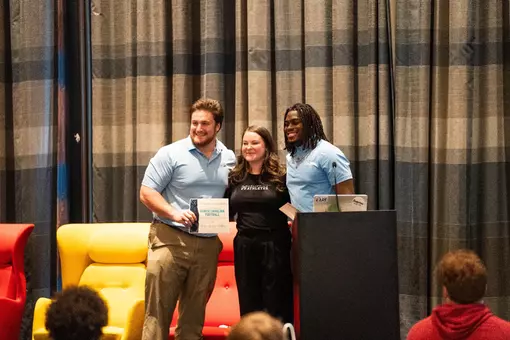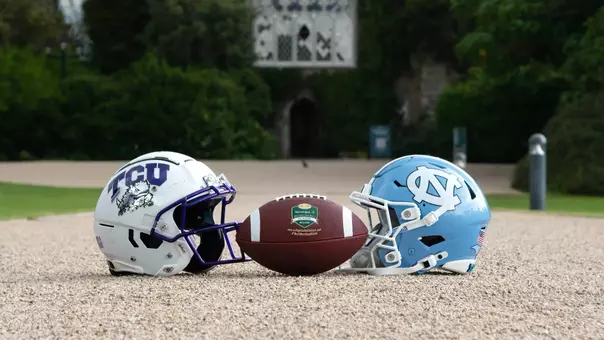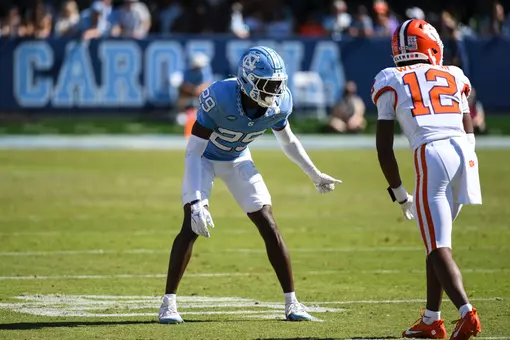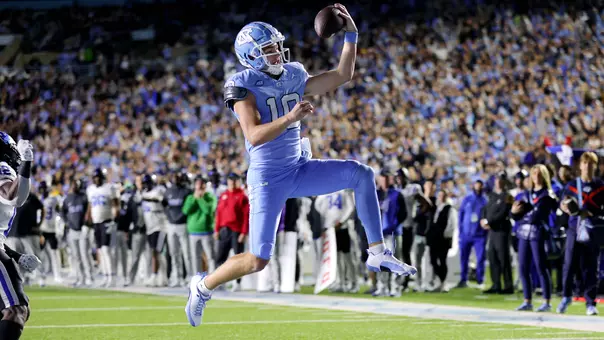University of North Carolina Athletics
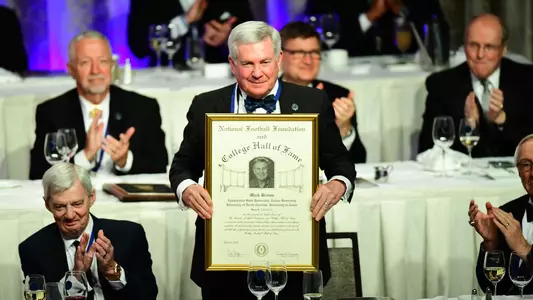
Extra Points: Filling The Void
December 5, 2018 | Football, Featured Writers, Extra Points
By Lee Pace
Mack Brown stood on the dais in the ballroom of a midtown hotel in New York City Tuesday night, addressing an audience of hundreds in the business of football—from Dallas Cowboys owner Jerry Jones to ex-quarterbacking greats Roger Staubach and Archie Manning. He spoke of his last five years working as a studio analyst for ABC and ESPN—"On TV, you give opinions instead of making decisions, and that's fun," Brown said to a round of laughter. "Coaches are sweating at halftime, and I'm sitting there watching six games and I can say, 'I'm going to get something to eat.' TV's not a bad gig."
He reminisced over the last 11 months after he'd learned he'd been named to the Hall of Fame traveling from Boone to Austin and being feted at celebrations at his stops over 30 years as a head coach—at Appalachian State, Tulane, Carolina and Texas. Some of his former players are now grandparents. Many are ultra-successful businessmen. Some have grown into being coaches and teachers in the mold of Brown himself. He spoke of how this "victory tour" of sorts had stirred an energy deep inside him and his wife, Sally.
"We reconnected with all of these guys in my life and Sally's life that trusted us to come, number one, and then did all the things we asked them to do to have a great program," he said, those outstanding programs defined as two back-to-back top-10 finishes at Chapel Hill in 1996-97 and a national title in Austin in 2005. "They have come up and said, 'You jumped on me that day and now I understand, I didn't like it at the time, but I'm raising my kids like you raised me.' That happened time and time again. Sally and I figured out, 'You better be really careful what you say, because the guys are listening.'"
Through it all, the Browns realized they missed the personal connections—celebrating a big touchdown catch, the birth of a first child and burrowing into the inevitable muck. Which is why Carolina needing a new coach and a shot of energy after 3-9 and 2-9 seasons was a right-place-right-time situation if ever there was one. Brown referenced the NFF's "Football Matters" theme, a grassroots campaign to promote the benefits of the game while stressing safety initiatives from helmet construction to tackling technique.
"There was a void," Brown said. "As much fun as we were having, we didn't have young people to mentor. We didn't have these guys. There was a void. That's what coaches do, they coach. If you ask yourself, 'Does coaching matter?' and ask yourself, 'Does football matter?' just look around.
"Yes, it does."
These guys.
Guys like Dusty Renfro, who played one year under Brown at Texas in 1998 and Matt Trissel, who played four years for the Longhorns from 1999-2002. Today they are partners in an oil services business in Austin, and Renfro says listening to Trissel run a company staff meeting, "Sounds exactly like Coach Brown all those years ago, same messages on teamwork and standards and accountability." They felt "an obligation," Trissel says, to come to New York and be in the audience when Brown was inducted.
"He's not finished," Renfro says of Brown's new head coaching chapter. "He was out of place not coaching, you could see it."
Trissel was a sophomore fighting for a starting job in spring practice when his mother called to say her husband, Matt's stepfather, was leaving her. Trissel called Brown at home at 10:30 to say he had to go see his mom back home in Teague, a small town in east Texas. Brown told him to go take care of his mom.
"Forty-five minutes down the road, I get a call from Coach Brown," Trissel says. "He said he thought he needed to go with me. I said, 'Thanks, Coach, but you don't need to do that.' The next day, my mom shows up in her classroom where she was a teacher, and there were three dozen red roses waiting for her. Three days later, Coach and Sally took my mom into their home for four or five days just to help her through a tough time.
"They didn't need to do that. But that's who they are. There are stories like that all over the place."
Two former Tar Heels in the audience are Thomas Smith and Johnathan Robertson, walk-ons at Carolina in the early 1990s. Smith came from tiny Gates County High as an invited walk-on and earned a scholarship two weeks into August training camp in 1989. He went on to an All-ACC career as a cornerback and nine years in the NFL, six with the Buffalo Bills. Robertson came to Chapel Hill from high school in Apex and growing up in Cary, played mostly on special teams and now is president and managing director of TG Capital, a Miami-based development concern.
"Mack helped me fulfill a dream," says Smith, who now manages real estate in Baltimore and is working on an MBA. "I came from nowhere, no one knew me. He saw something in me and gave me a scholarship. Then he rode me unmercifully. He gave me a scholarship during a Sunday night team meeting, and the next day in practice he was all over my butt. I appreciate his ability to be a father-figure and instill a degree of toughness in all his players."
Robertson graduated from Carolina in 1993 and then attended Harvard Law School. He remembers receiving a hand-written, congratulatory note from Brown on his law degree.
"The lesson with Thomas and me is, it doesn't matter where you start, what really matters is how hard you're willing to work and how far you're willing to go with it," Robertson says. "He pushes you to reach your potential.
"Thomas is arguably one of the best walk-ons to come out of Carolina. My success wasn't on the football field. But he pushed both of us. Our success after Chapel Hill is every bit as important to him as what we did there. It was all about the example he set and the life he wanted you to leave. The one thing I'll always remember is he just wanted you to compete. On the field, in the classroom, for me that's carried on for more than 30 years. He always used to say, 'You've just gotta compete.' For me that's always been a big lesson."
Brown on Tuesday night was one of three coaches and 10 players inducted into the Hall of Fame, which also includes Carolina luminaries Carl Snavely and Jim Tatum from the coaching profession and Charlie Justice, Art Weiner, Don McCauley, Dre Bly and William Fuller as players. The other two coaches honored were Frank Beamer, who retired in 2015 after an illustrious career at Virginia Tech, and Mel Tjeerdsma, longtime coach at Austin College in Texas and Northwest Missouri State.
Robertson considers the list of coaches already enshrined, men the ilk of Bear Bryant, Darrell Royal, Bobby Bowden and Joe Paterno.
"I think it is amazing at a Hall of Fame event to celebrate a career for someone who's starting the next chapter," he says. "That's pretty unique. I'm not sure how often that happens."
Over three days of festivities in New York, several dozen former Tar Heels and Longhorns attended for dinner functions, to glad-hand and reminisce with Brown and consider the next episode in his coaching journey.
"What I'm most happy about," Longhorn Dusty Renfro says, "is those kids in that meeting room at Carolina have no idea what's about to happen. They have no clue how blessed and fortunate they're going to be."
Lee Pace (Carolina 1979) has been writing "Extra Points" since 1990, conceiving it in the wake of Mack Brown's 2-20 beginning as the Tar Heels' head coach. Write him at leepace7@gmail.com and follow him @LeePaceTweet.
Mack Brown stood on the dais in the ballroom of a midtown hotel in New York City Tuesday night, addressing an audience of hundreds in the business of football—from Dallas Cowboys owner Jerry Jones to ex-quarterbacking greats Roger Staubach and Archie Manning. He spoke of his last five years working as a studio analyst for ABC and ESPN—"On TV, you give opinions instead of making decisions, and that's fun," Brown said to a round of laughter. "Coaches are sweating at halftime, and I'm sitting there watching six games and I can say, 'I'm going to get something to eat.' TV's not a bad gig."
He reminisced over the last 11 months after he'd learned he'd been named to the Hall of Fame traveling from Boone to Austin and being feted at celebrations at his stops over 30 years as a head coach—at Appalachian State, Tulane, Carolina and Texas. Some of his former players are now grandparents. Many are ultra-successful businessmen. Some have grown into being coaches and teachers in the mold of Brown himself. He spoke of how this "victory tour" of sorts had stirred an energy deep inside him and his wife, Sally.
"We reconnected with all of these guys in my life and Sally's life that trusted us to come, number one, and then did all the things we asked them to do to have a great program," he said, those outstanding programs defined as two back-to-back top-10 finishes at Chapel Hill in 1996-97 and a national title in Austin in 2005. "They have come up and said, 'You jumped on me that day and now I understand, I didn't like it at the time, but I'm raising my kids like you raised me.' That happened time and time again. Sally and I figured out, 'You better be really careful what you say, because the guys are listening.'"
Through it all, the Browns realized they missed the personal connections—celebrating a big touchdown catch, the birth of a first child and burrowing into the inevitable muck. Which is why Carolina needing a new coach and a shot of energy after 3-9 and 2-9 seasons was a right-place-right-time situation if ever there was one. Brown referenced the NFF's "Football Matters" theme, a grassroots campaign to promote the benefits of the game while stressing safety initiatives from helmet construction to tackling technique.
"There was a void," Brown said. "As much fun as we were having, we didn't have young people to mentor. We didn't have these guys. There was a void. That's what coaches do, they coach. If you ask yourself, 'Does coaching matter?' and ask yourself, 'Does football matter?' just look around.
"Yes, it does."
These guys.
Guys like Dusty Renfro, who played one year under Brown at Texas in 1998 and Matt Trissel, who played four years for the Longhorns from 1999-2002. Today they are partners in an oil services business in Austin, and Renfro says listening to Trissel run a company staff meeting, "Sounds exactly like Coach Brown all those years ago, same messages on teamwork and standards and accountability." They felt "an obligation," Trissel says, to come to New York and be in the audience when Brown was inducted.
"He's not finished," Renfro says of Brown's new head coaching chapter. "He was out of place not coaching, you could see it."
Trissel was a sophomore fighting for a starting job in spring practice when his mother called to say her husband, Matt's stepfather, was leaving her. Trissel called Brown at home at 10:30 to say he had to go see his mom back home in Teague, a small town in east Texas. Brown told him to go take care of his mom.
"Forty-five minutes down the road, I get a call from Coach Brown," Trissel says. "He said he thought he needed to go with me. I said, 'Thanks, Coach, but you don't need to do that.' The next day, my mom shows up in her classroom where she was a teacher, and there were three dozen red roses waiting for her. Three days later, Coach and Sally took my mom into their home for four or five days just to help her through a tough time.
"They didn't need to do that. But that's who they are. There are stories like that all over the place."
Two former Tar Heels in the audience are Thomas Smith and Johnathan Robertson, walk-ons at Carolina in the early 1990s. Smith came from tiny Gates County High as an invited walk-on and earned a scholarship two weeks into August training camp in 1989. He went on to an All-ACC career as a cornerback and nine years in the NFL, six with the Buffalo Bills. Robertson came to Chapel Hill from high school in Apex and growing up in Cary, played mostly on special teams and now is president and managing director of TG Capital, a Miami-based development concern.
"Mack helped me fulfill a dream," says Smith, who now manages real estate in Baltimore and is working on an MBA. "I came from nowhere, no one knew me. He saw something in me and gave me a scholarship. Then he rode me unmercifully. He gave me a scholarship during a Sunday night team meeting, and the next day in practice he was all over my butt. I appreciate his ability to be a father-figure and instill a degree of toughness in all his players."
Robertson graduated from Carolina in 1993 and then attended Harvard Law School. He remembers receiving a hand-written, congratulatory note from Brown on his law degree.
"The lesson with Thomas and me is, it doesn't matter where you start, what really matters is how hard you're willing to work and how far you're willing to go with it," Robertson says. "He pushes you to reach your potential.
"Thomas is arguably one of the best walk-ons to come out of Carolina. My success wasn't on the football field. But he pushed both of us. Our success after Chapel Hill is every bit as important to him as what we did there. It was all about the example he set and the life he wanted you to leave. The one thing I'll always remember is he just wanted you to compete. On the field, in the classroom, for me that's carried on for more than 30 years. He always used to say, 'You've just gotta compete.' For me that's always been a big lesson."
Brown on Tuesday night was one of three coaches and 10 players inducted into the Hall of Fame, which also includes Carolina luminaries Carl Snavely and Jim Tatum from the coaching profession and Charlie Justice, Art Weiner, Don McCauley, Dre Bly and William Fuller as players. The other two coaches honored were Frank Beamer, who retired in 2015 after an illustrious career at Virginia Tech, and Mel Tjeerdsma, longtime coach at Austin College in Texas and Northwest Missouri State.
Robertson considers the list of coaches already enshrined, men the ilk of Bear Bryant, Darrell Royal, Bobby Bowden and Joe Paterno.
"I think it is amazing at a Hall of Fame event to celebrate a career for someone who's starting the next chapter," he says. "That's pretty unique. I'm not sure how often that happens."
Over three days of festivities in New York, several dozen former Tar Heels and Longhorns attended for dinner functions, to glad-hand and reminisce with Brown and consider the next episode in his coaching journey.
"What I'm most happy about," Longhorn Dusty Renfro says, "is those kids in that meeting room at Carolina have no idea what's about to happen. They have no clue how blessed and fortunate they're going to be."
Lee Pace (Carolina 1979) has been writing "Extra Points" since 1990, conceiving it in the wake of Mack Brown's 2-20 beginning as the Tar Heels' head coach. Write him at leepace7@gmail.com and follow him @LeePaceTweet.
UNC Baseball: Paulsen Homers Twice in 13-3 Win vs VCU
Thursday, February 26
THE ARENA DISCUSSION - Episode 1: Lee Roberts & Bubba Cunningham
Wednesday, February 25
UNC Baseball: Hull, Schaffner Lift Tar Heels Over NC A&T, 9-1
Tuesday, February 24
Chloe Humphrey Receives 2025 Honda Award - February 23, 2026
Tuesday, February 24











